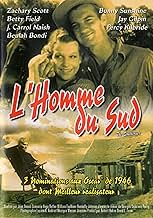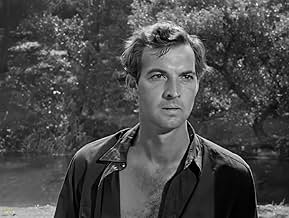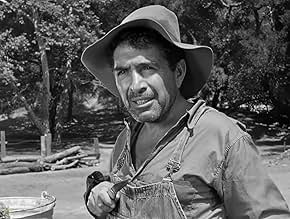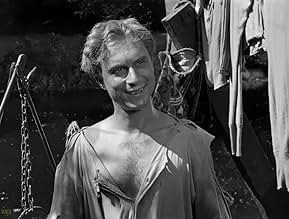PUNTUACIÓN EN IMDb
7,1/10
4,1 mil
TU PUNTUACIÓN
Los Tucker, una familia pobre de jornaleros del algodón, decide comprar su propio terreno, pero la naturaleza está en su contra.Los Tucker, una familia pobre de jornaleros del algodón, decide comprar su propio terreno, pero la naturaleza está en su contra.Los Tucker, una familia pobre de jornaleros del algodón, decide comprar su propio terreno, pero la naturaleza está en su contra.
- Dirección
- Guión
- Reparto principal
- Nominado para 3 premios Óscar
- 3 premios y 3 nominaciones en total
Paul E. Burns
- Uncle Pete
- (as Paul Burns)
Audley Anderson
- Townsman
- (sin acreditar)
Rudy Bowman
- Townsman
- (sin acreditar)
Reseñas destacadas
The opening shot amounts to a wonderfully compelling hymnal to the land and those who toil there, while the rest of the movie attempts to follow through with that noble theme. There's no doubt that this is one of the most laudable movie projects to come out of the decade. But for all the earnest concern, there's still too much of the theatrical for my liking. I know, the film is generally hailed by critics, and there's much to be said for its consistent down-and-dirty look at the plight of the southern share-cropper. But there's also a staginess to many of the characters and scenes that blemishes director Renoir's naturalistic approach.
Consider Beulah Bondi's over-the-top turn as Granny. She's supposed to offer amusingly caustic comments on events as relief from the rigors of the plot. The trouble is that both she and the camera rub our nose in the role. They just as well have hung a sign around her neck saying "crusty old woman". The bad make-up job doesn't help either and serves as a constant reminder that the Tuckers are after all only a make-believe family. Since she's a central character, the flaws in her wild eye-rolling performance are hard to ignore.
The other acting is fine, especially from Scott in the lead role as Sam. However, both he and wife Nona (Field) are more stereotypes than multi-dimensional people. He's the noble, tireless worker, and so is she. Together, they are unwavering in their support of each other and the farm. And when Sam does waver after the flood, it's Nona providing the strength to persevere. Thus, it's the whole family and not just Sam plowing the field that will make the farm a success. That's a good point for the script to make. The trouble is that Sam and Nona are simply too good to be believable in the face of all the adversity. At least one breakdown scene where the emotional toll of the wrenching burdens is expressed would have added a more human dimension. Writer Renoir is simply too insistent on the nobility of the two characters, turning them more into symbols than complex real people.
On the other hand, the hostile neighbor Devers (Naish) is the most interesting of the characters. His dark resentful nature would appear to come from uncredited co-writer William Faulkner who specialized in such Gothic personalities. The real agonizing story of what it means to start up a farm is told by the embittered old man in what I take to be the movie's central scene. He's made a success, but that success has made him hard and mean, and now he lives in fear of anyone rising above him. I wish the screenplay had not betrayed that dark impact for the price of a big fish in what strikes me as a very implausible turn- around scene on the riverbank.
The film's virtues are pretty obvious. There's a real effort at showing rural poverty and its effects on people, never a Hollywood biggie. When little Daisy lovingly puts on the crude blanket-coat, I was reminded of a world so easily passed over in a nation of commercialized malls. Ditto the well-done possum feast, where the simple act of eating means so much more. And especially when the family and we gather around the little hearth fire to peer into the glow through eyes much more ancient than our own. These are indelible scenes that transcend the movie screen and alone are worth the price of the movie.
Maybe it took a European auteur outside the usual studio framework to want to deal as honestly as possible with such a non-commercial theme. But the location shooting and insistence on the unglamorous, even down to the very unHollywood barfly, add up to what looks like an effort at honest depiction. Of course, Renoir's well-known humanism and rollicking humor show up in the party scene in what amounts to a folk celebration of life and community. Then too, there's that telling scene between Sam and Tim (Kemper) where each comes to appreciate the contributions of the other in supplying the community's needs. Whatever the film's regrettable flaws, the message remains a powerful one that needs constant retelling, especially in our own cynical times. Too bad Renoir didn't stay on this side of the Atlantic. His influence on our own movie-makers would have pushed them in a much needed direction.
Consider Beulah Bondi's over-the-top turn as Granny. She's supposed to offer amusingly caustic comments on events as relief from the rigors of the plot. The trouble is that both she and the camera rub our nose in the role. They just as well have hung a sign around her neck saying "crusty old woman". The bad make-up job doesn't help either and serves as a constant reminder that the Tuckers are after all only a make-believe family. Since she's a central character, the flaws in her wild eye-rolling performance are hard to ignore.
The other acting is fine, especially from Scott in the lead role as Sam. However, both he and wife Nona (Field) are more stereotypes than multi-dimensional people. He's the noble, tireless worker, and so is she. Together, they are unwavering in their support of each other and the farm. And when Sam does waver after the flood, it's Nona providing the strength to persevere. Thus, it's the whole family and not just Sam plowing the field that will make the farm a success. That's a good point for the script to make. The trouble is that Sam and Nona are simply too good to be believable in the face of all the adversity. At least one breakdown scene where the emotional toll of the wrenching burdens is expressed would have added a more human dimension. Writer Renoir is simply too insistent on the nobility of the two characters, turning them more into symbols than complex real people.
On the other hand, the hostile neighbor Devers (Naish) is the most interesting of the characters. His dark resentful nature would appear to come from uncredited co-writer William Faulkner who specialized in such Gothic personalities. The real agonizing story of what it means to start up a farm is told by the embittered old man in what I take to be the movie's central scene. He's made a success, but that success has made him hard and mean, and now he lives in fear of anyone rising above him. I wish the screenplay had not betrayed that dark impact for the price of a big fish in what strikes me as a very implausible turn- around scene on the riverbank.
The film's virtues are pretty obvious. There's a real effort at showing rural poverty and its effects on people, never a Hollywood biggie. When little Daisy lovingly puts on the crude blanket-coat, I was reminded of a world so easily passed over in a nation of commercialized malls. Ditto the well-done possum feast, where the simple act of eating means so much more. And especially when the family and we gather around the little hearth fire to peer into the glow through eyes much more ancient than our own. These are indelible scenes that transcend the movie screen and alone are worth the price of the movie.
Maybe it took a European auteur outside the usual studio framework to want to deal as honestly as possible with such a non-commercial theme. But the location shooting and insistence on the unglamorous, even down to the very unHollywood barfly, add up to what looks like an effort at honest depiction. Of course, Renoir's well-known humanism and rollicking humor show up in the party scene in what amounts to a folk celebration of life and community. Then too, there's that telling scene between Sam and Tim (Kemper) where each comes to appreciate the contributions of the other in supplying the community's needs. Whatever the film's regrettable flaws, the message remains a powerful one that needs constant retelling, especially in our own cynical times. Too bad Renoir didn't stay on this side of the Atlantic. His influence on our own movie-makers would have pushed them in a much needed direction.
Beautifully shot, absorbing film about the close-knit Tucker clan - Sam (Zachary Scott), the handsome dad who loves being a farmer, Nona (Betty Field), a good wife and mother who always seems to look well-groomed in spite of her hard work, two really cute kids, and then there's ornery old Granny (Beulah Bondi), she of the sharp tongue and stubborn will. In a gorgeously photographed scene where they are working for hire in the bright, sunlit fields picking cotton - the couple watches as their Uncle dies in the fields saying in his last breath "Grow your own crops", and they decide to do just that. Soon they have rented a property where they can raise cotton and be their own masters, so to speak - well, the house turns out to be nothing but a broken-down, ramshackle shack, the whole place needs loads and loads of work - but one good thing" it has "good earth". Troubles ensue - trouble with the neighbors, trouble getting food, sickness troubles, weather troubles, oh brother!
Well, this is an excellent, heartfelt, and well photographed film done in an unusual, distinctive style. The actors who play the Tucker family do a good job in making this actually seem like a real family and make you want to root for them - but it is Beulah Bondi as cantankerous Granny who really steals this film for me - I really enjoyed her scenes and thought they added a little spice to this! The hardships this clan has to go through can be hard to watch sometimes, but the story is involving and the film is quite memorable.
Well, this is an excellent, heartfelt, and well photographed film done in an unusual, distinctive style. The actors who play the Tucker family do a good job in making this actually seem like a real family and make you want to root for them - but it is Beulah Bondi as cantankerous Granny who really steals this film for me - I really enjoyed her scenes and thought they added a little spice to this! The hardships this clan has to go through can be hard to watch sometimes, but the story is involving and the film is quite memorable.
An employee named Sam Tucker (Zachary Scott)frequently working for others is hired some land and he decides along with his family, -his wife (Betty Field), granny (Beulah Bondi)and two sons - attempt farming for themselves. The family finds hardships on their way and they'll have to fight against the elements,ills, poorness, distresses and a selfish neighbor (J. Carroll Naish) living with his daughter (Nash) and niece (Norman Lloyd) .
This is a rural drama about a survival fight amid all disgraces and terrible elements. It's a naturalistic drama splendidly played and magnificently staged. From the tale 'Hold Autumn in your hand' by George Sessions Perry and writing by William Faulkner though he appears uncredited. It's proceeded in similar style to ¨Grapes of wrath¨ by John Ford based on John Steinbeck novel . First rate performances by all star cast. Special mention to Belulah Bondi as sympathetic and and grumpy granny. And Norman Lloyd as roguish nephew, he's a veteran player still acting , who joined the original company of Orson Welles-John Houseman Mercury Theatre and after that he was hired to Hollywood to play as secondary actor in Alfred Hitchcock movie and other ones and made him an associate producer. Neo-realist and evocative cinematography by Lucien Andriot. Sensible and imaginative musical score by Werner Janssen.
The flick is excellently directed by Jean Renoir. He said about 'The Southerner' gave him more pleasure than any of his other Hollywood work. Renoir was voted the 12th greatest director of all time . Furthermore, Orson Welles frequently cited him as the greatest movie director of all time. He was son of the famous impressionist painter Auguste Renoir. After his French classics (Rules of game 1939, Human beast 38, La Marseillase 36, A day in the country 36, Boudu saved from drowning 32), he was brought to USA by American producers, directing awesome films in Hollywood (Woman on the beach 1947 , The diary of a chambermaid 46, The Southerner , The land is mine 43, Swamp water 1941). Later on, he returned to France , going on film-making classic movies (Elusive corporal 1962, Picnic on the grass 59, Testament of Dr Cordelier 59, Golden coach 52, The river 1951). Rating : Better than average, well worth watching.
This is a rural drama about a survival fight amid all disgraces and terrible elements. It's a naturalistic drama splendidly played and magnificently staged. From the tale 'Hold Autumn in your hand' by George Sessions Perry and writing by William Faulkner though he appears uncredited. It's proceeded in similar style to ¨Grapes of wrath¨ by John Ford based on John Steinbeck novel . First rate performances by all star cast. Special mention to Belulah Bondi as sympathetic and and grumpy granny. And Norman Lloyd as roguish nephew, he's a veteran player still acting , who joined the original company of Orson Welles-John Houseman Mercury Theatre and after that he was hired to Hollywood to play as secondary actor in Alfred Hitchcock movie and other ones and made him an associate producer. Neo-realist and evocative cinematography by Lucien Andriot. Sensible and imaginative musical score by Werner Janssen.
The flick is excellently directed by Jean Renoir. He said about 'The Southerner' gave him more pleasure than any of his other Hollywood work. Renoir was voted the 12th greatest director of all time . Furthermore, Orson Welles frequently cited him as the greatest movie director of all time. He was son of the famous impressionist painter Auguste Renoir. After his French classics (Rules of game 1939, Human beast 38, La Marseillase 36, A day in the country 36, Boudu saved from drowning 32), he was brought to USA by American producers, directing awesome films in Hollywood (Woman on the beach 1947 , The diary of a chambermaid 46, The Southerner , The land is mine 43, Swamp water 1941). Later on, he returned to France , going on film-making classic movies (Elusive corporal 1962, Picnic on the grass 59, Testament of Dr Cordelier 59, Golden coach 52, The river 1951). Rating : Better than average, well worth watching.
Life in Renoir films is always one damned thing - or one absorbing incident - after another, which is why the ideal Renoir film (a) sticks to the one subject, or the one place ("Grand Illusion" WOULD be as great as everyone says it is, if only it didn't wander about so), and (b) doesn't even purport to have a plot. (Not that the second requirement matters so much as the first.) In any case, the material Renoir had here suited him down to the ground. The fact that the central character is tied to the land, the fact that he has a clear goal (to survive by means of farming) without having any particular quest, allows Renoir to let whatever will happen, happen, without there being any danger of the film falling apart.
A delightfully warm film, but one with a real bite. It carries a real charge when the established farmer, after treating the newcomer with such unjustified coldness you start to feel he must be positively evil, begins to reveal his humanity and open up a little - only to describe, in detail, why he's so bitter - and determined to remain bitter. But this is just one perfectly realised scene among many. There's so MUCH to this film, not one segment of which could profitably be lost - except, of course, the minute-long spoken prologue, which contributes about as much to the overall effect as Cecil B. DeMille's anti-communist rant contributes to "The Ten Commandments". But ignore that last nit-pick.
A delightfully warm film, but one with a real bite. It carries a real charge when the established farmer, after treating the newcomer with such unjustified coldness you start to feel he must be positively evil, begins to reveal his humanity and open up a little - only to describe, in detail, why he's so bitter - and determined to remain bitter. But this is just one perfectly realised scene among many. There's so MUCH to this film, not one segment of which could profitably be lost - except, of course, the minute-long spoken prologue, which contributes about as much to the overall effect as Cecil B. DeMille's anti-communist rant contributes to "The Ten Commandments". But ignore that last nit-pick.
Renoir was still a master and had definitely not lost his touch when he made this saga about a year in the life of a desperately poor farming family trying to make it. The only thing that mars it, keeping it from rating a 10, are the cutesy-poo children and the saccharine music on the soundtrack, making it perfectly clear exactly how you were supposed to feel at any given moment. I suppose these were necessary nods to Hollywood conventions of the time. Kudos must go to Zachary Scott for the courage of his performance in the lead. An underrated actor, Scott was nearly always cast playing lounge lizards and other assorted slimeballs. Here he appears without his mustache and is almost unrecognizable. Given that Scott aspired to a career as a Gable-type leading man, this role was not a good career move. But it is definitely the performance of his career, and along with the equally outstanding performance of Betty Field, makes the film. Incidentally, I could have done without the over the top performance of Beulah Bondi as Granny; throughout the film I kept hoping Scott would strangle her.
¿Sabías que...?
- CuriosidadesBased on the novel "Hold Autumn in your Hand", by George Sessions Perry, which won the first National Book Award in 1941.
- PifiasWhen Finley whipped the cows the dog disappeared for a second Indicating a film cut.
- ConexionesEdited into 365 days, also known as a Year (2019)
Selecciones populares
Inicia sesión para calificar y añadir a tu lista para recibir recomendaciones personalizadas
- How long is The Southerner?Con tecnología de Alexa
Detalles
- Fecha de lanzamiento
- País de origen
- Idioma
- Títulos en diferentes países
- The Southerner
- Localizaciones del rodaje
- Madera, California, Estados Unidos(cotton fields)
- Empresas productoras
- Ver más compañías en los créditos en IMDbPro
Taquilla
- Presupuesto
- 750.000 US$ (estimación)
- Duración1 hora 32 minutos
- Color
- Relación de aspecto
- 1.37 : 1
Contribuir a esta página
Sugerir un cambio o añadir el contenido que falta

Principal laguna de datos
By what name was El sureño (1945) officially released in India in English?
Responde




































